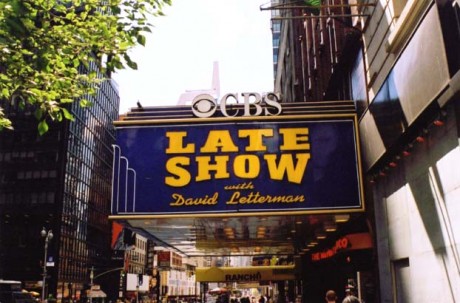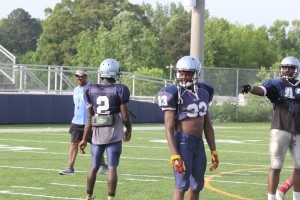The days trickle down to a precious few for the on-air tenure of the Hamlet of Late Night, David Letterman. There’s a palpable feeling of national diffidence surrounding his departure from the Ed Sullivan Theatre.
It was an easier sort of transition to evaluate when Johnny Carson made his exit back in 1992. The Nebraskan comic legend arguably transformed America’s TV-watching habits during his storied 30-year reign on The Tonight Show (which actually included the superfluous words starring Johnny Carson in its official title). Johnny was handsome, charming, quick-witted and, thanks in part to excellent gag writers, his nightly topical monologue became what critic Les Brown termed “America’s bedtime story.” Operating in the hours once called “fringe time,” Carson became the biggest television star in the country and one of the richest. When he decided to retire, it was an occasion for national lament.
The guy he thought ought to succeed him was David Letterman.
As I’ve been watching the last shows of Letterman on CBS, I still wonder what Johnny was thinking. Dave wound up making a mark of his own after hours, but it’s hard to imagine that the 1992 model Letterman would have held on to King Carson’s throne at NBC. In retrospect, it might be that losing the Tonight Show gig to Jay Leno was the best thing that could have happened to Dave Letterman.
Certainly Dave owed his shot at the big leagues to Johnny. When Carson renegotiated his contract with NBC in 1979, one of the perks of his $50 million deal was cutting his 90-minute show down to one hour per weeknight. That opened up a new one-hour time slot just after Tonight, which was to be developed by Carson Productions and which was to be hosted by a 34 year-old Indianan whose most recent TV outing, a 90-minute mid-morning comedy show called The David Letterman Show, had been canceled after 18 weeks for poor ratings.
One reason Dave’s morning show hadn’t found an audience was because most folks watching at that time of day didn’t know what to make of bits like “Stupid Pet Tricks” and “Viewer Mail,” high-concept comedy dreamed up by Merrill Markoe, a writer with whom Letterman was romantically involved at the time. However, NBC President Fred Silverman liked him and started plugging him in as Johnny’s occasional guest host. Carson, for his part, recognized his fellow Midwesterner’s ease in front of a camera.
I suspect the most important figure in establishing Letterman in late-night TV was David Tebet, the NBC executive who had originally recruited Carson for Tonight. He “was like a talent liaison in the same way that Al Capone was a beverage distributor,” Letterman recalled recently for The New York Times.
Because Dave’s was to immediately follow Carson’s show, Tebet stipulated that the new Late Night with David Letterman must bear little resemblance to The Tonight Show: no jovial sidekick, no horn section, no monologue, no A-list guests. Denied the trappings of show business, Letterman and associates set off on an epic journey to make fun of show business.
Last week I dug out and viewed my tape of the first NBC Letterman show. It was just as goofy and ambitious as I’d remembered. It opened with character actor Calvert DeForrest (you knew him and loved him as Larry “Bud” Melman) in silhouette, warning viewers that what they were about to see might shock them. There followed a running gag involving video of different kinds of welding. Dave took the camera on a tour of the backstage area, then Bill Murray (looking a couple of sheets to the wind) came out for an archly snarky “interview” which ended with him bringing up an audience member to exercise as Paul Shaffer’s combo played “Let’s Get Physical.”
Show business, as Johnny Carson’s generation understood it, was about to be pushed to the wings. Letterman’s success after hours became a generational shift bringing a younger stratum of regular viewers to broadcast TV. Late Night was seen as a comedic bellwether, although TV historians could draw clear lines between Letterman’s absurdist bits and those of comedians Steve Allen and Ernie Kovacs thirty years earlier.
I think it was the absurdity that NBC feared when it was time to replace the beloved Carson. You can read Bill Carter’s The Late Shift for the facts of what went down, but I believe the network simply thought Jay Leno the safer bet to protect the Tonight Show money machine. Dave got fat stacks and a better wardrobe to move to CBS and, in the first years of The Late Show with David Letterman, made a respectable run at Johnny’s ratings with a gentrified version of his old late-night hi-jinx. Ultimately, though, the undemanding Leno found a larger favor with the end-of-the-century TV audience. Demographic fragmentation and niche cable programming, let alone the rise of the Internet, meant the end of mass-appeal broadcasting. Dave was doomed never to be the King of Late Night.
There was a lot of unspoken regret between the lines of Letterman’s exit interview with the Times April 29. You ought to read it; it’s perhaps the most candid Dave on record and certainly the most unflinching self-evaluation by any public personality I can recall.
“In the beginning you think, I can’t wait to get on television. I’m going to straighten it out,” he said. “That’s how you feel. And now I don’t feel that way.”
David Letterman’s going to wind up in TV Valhalla alongside Jack Paar and Dick Cavett (not a bad place to be) but more importantly, he’ll have some bonus time now to spend with a wife and son in surroundings more convivial than the public spotlight. I’ll be watching his last show next Wednesday. I hear Bill Murray might be on again. Me and Dave used to hang out together, man. Good times.






